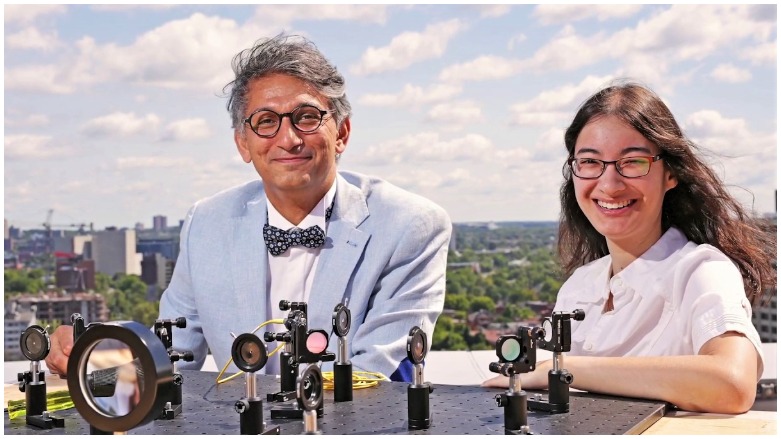Kurd wins top physics prize in Canada

ERBIL (Kurdistan 24) - Ebrahim Karimi, Professor with the Department of Physics from the University of Ottowa and originally from Iranian Kurdistan, last month was awarded the 2020 Canadian Association of Physicists (CAP) Herzberg Medal.
The prize, which recognizes outstanding achievement by an early-career Canadian physicist, was awarded to Prof. Karimi for “his innovative leadership in developing structured quantum waves for applications to quantum communication and computation, microscopy and materials science,” CAP said in a press release.
I will be giving 2020 CAP Herzberg Medal talk tomorrow. The full program: 11:00–11:30 Eric Hessels; 11:30–12:00 Ken Ragan; 14:00–14:30 Ebrahim Karimi; 14:30–15:00 Gordon C. Ball
— Ebrahim Karimi (@ebi_karimi) December 21, 2020
Zoom platform👉 https://t.co/ApaQhQVBM2
ID: 89774974371
Pass:965287 pic.twitter.com/divWGanUUI
The award was introduced in 1970. Prior to 2011, it was awarded for outstanding achievement by a Canadian physicist under the age of 40.
Karimi has also publically supported the Kurdish cause. Last year in October he wrote an essay during the Turkish attack on Syrian Kurds and called on the international community to act. He also delivered correspondence to the prestigious Nature journal on the woes of Kurds in the Middle East.
Being a Kurd will never be easy! My mother slapped me on the face when I told her, “I let my brother’s hands go, when we ran.” ... 👉 https://t.co/TX6IaZoA7p
— Ebrahim Karimi (@ebi_karimi) June 19, 2020
This is a short essay that I prepared a while ago. This is the life of Kurds, even nowadays-We need a world full of peace
As a child some 30 years ago, Karimi himself experienced Iraqi jets bombing his city of Saghez in Iran’s Kurdish-majority northwest. His father had been arrested by the Iranian regime and “sentenced to death a few years earlier because he had supported a Kurdish political party.”
“At that age, I learned that being a Kurd was not easy and that it was not going to be easy. That indeed the Kurds had no friends but the mountains,” he wrote in the essay.
“We did not have the right to read, write, and speak in Kurdish (our mother tongue) in school. Almost three years later, Saddam [Hussein] used chemical weapons against the Kurds and killed over 3,000 civilians in one day – more than 10,000 were affected for the rest of their lives.”
“It is an unfortunate destiny for Kurds, who always stayed with their allies and did not betray them, but instead they were betrayed,” he said, referring to US President Donald Trump’s decision to effectively green light last year’s Turkish invasion of Syria which he said “has not only affected many Kurds around the globe, it has clearly created a ‘vacuum’ for the extremists in the region.”
Karimi received his diploma in Mathematics and Physics from Eghbal Lahori in the Kurdish town of Saghez in 1997, according to his biography published by the University of Ottawa.
It reads, “He fell in love with physics and mathematics as a high school student while attending several national physics conferences. He received a B.Sc. in Physics with emphasis in mathematics from Kerman University in 2001.”
He also taught for three years at the University of Kurdistan in Sanandaj in Iranian Kurdistan. Later he moved to Italy in 2007 to work on his Ph.D. which he received two years later from the University of Naples, where he then worked as a postdoctoral fellow.
In 2012, he moved to Canada to teach and do research. Three years later, he received the title of Canada Research Chair from the government of Canada.
Prof. Karimi received several awards during his recent career in North America, such as Ontario’s Early Researcher Award, the Young Researcher of the Year and the Faculty of Science awards at the University of Ottawa. He is a Fellow of the Optical Society (OSA), a member of the Global Young Academy (GYA), and a Fellow at the Max Planck Institute for the Science of Light, and a Fellow at the National Research Council Canada.
In September 2020, he became the recipient of an award by the Royal Society of Canada’s College of New Scholars, Scientist and Artists.
“The College recognizes individuals who have begun demonstrating leading scholarly, research or artistic excellence within 15 years of having completed their post-doctoral program or its equivalent,” according to a description by the RSC website.
Kurdish academics from Iranian Kurdistan have of late performed very well in the scientific and academic field both abroad and in the region.
In 2018, Caucher Birkar, a UK-based Cambridge University professor also originally from Iranian Kurdistan, won the prestigious Fields Medal, often called the Nobel prize for mathematics.
Editing by John J. Catherine and Khrush Najari